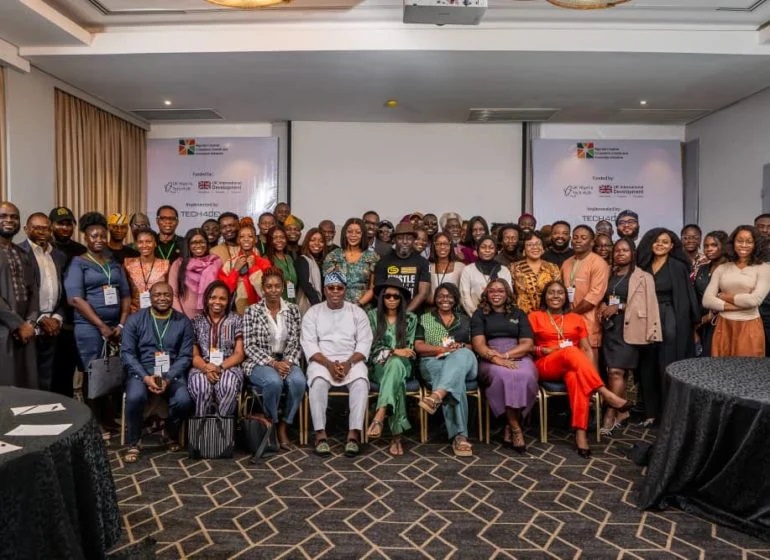Nigeria’s creative economy took centre stage on Thursday as the Technology for Social Change and Development Initiative (Tech4Dev), in partnership with the UK–Nigeria Tech Hub, unveiled a landmark 150-page report and an open-source Creative Economy Tracker.
The launch, supported by the UK’s Foreign, Commonwealth and Development Office under its Digital Access Programme, was held at the Radisson Hotel in Ikeja GRA, Lagos.
Titled State of Creative Innovation Ecosystem in Nigeria Report 2025, the document highlights the economic value and growth potential of four key industries: film, music, fashion, and content creation. It maps their value chains from creation to consumption, offering data-driven insights for stakeholders seeking to scale Nigeria’s creative sector globally.
Report launch
At the event, founder and president of Tech4Dev, Joel Ogunmola, said the report is a tracking point that reflects what the tech hub will explore and discover in future.
“We are super excited about the support we’ve received over the last year from the Foreign Commonwealth Development Office and as well as the support we’ve gotten from the States, from Lagos to Kwara to Plateau. Super excited, we think that this is only just the beginning of the work we will do.
“Based on feedback and some of the suggestions that we’ve received, look out and watch out for some next steps in terms of what we’re going to be doing around this. Ultimately, I say a very big thank you to the team, Michael and the rest of the team that also worked extensively on this.
“Super excited about what this will lead to in terms of starting a journey of really tracking where we are, what the gaps are and how far we still need to go and ultimately what the future state will look like,” Mr Ogunmola said.
Economic importance
Also, the co-founder and executive director of Tech4Dev, Oladiwura Oladepo, underscored the economic importance of the project.

According to her, the creative economy is the second-largest employer of labour in Nigeria, employing 1.2 million young people.
The executive director further stressed the need for adequate data to grasp the industry’s full potential for profit maximisation.
She explained the tech hub by realising that there is no data that gives insights into the creative industry in the country, which encouraged Tech4Dev to go on the mapping and research projects.
Ms Oladepo stated that the report revealed understanding into the challenges and opportunities that are impacting the creative economy. According to her, the use of the report data will help creatives, investors and governments in decision-making and maximisation of profits.
“Know how they can, it will help to also inform decision making, know where to channel resources and what areas that more money and more resources should be put into to enable the industry to be better,” she said.
Launching the reports, she explained that the data-gathering process, which included interviews and consultative sessions, covers 4 key sectors from 1700 participants from the film, fashion, music and content creation industries
Economy tracker
Michael John, an integral part of the project, who was the former country manager of Tech4Dev, said the Creative Economy Tracker is an open-source platform, allowing anyone to access and utilise the data for policy-making, investment, or industry development.

Mr John, who is also the senior partner of Avaara Partners, explained that the launch marks the close-out of the Nigeria Creative Growth and Innovation Initiative.
He disclosed that the research study shed light on the evolving landscape of Nigeria’s creative industry, revealing both opportunities and challenges.
“A lot of research has been done in the past, but none has actually taken the standpoint of the value chain, which means understanding how value is created, from creation/conceptualisation to production, to distribution, getting it into the hands of consumers and exhibition.
“Afrobeats, across the world, is one of the top five music genres consumed. We wanted to understand what it was like for the average creator. Where do you get the skill from? How do you come up with the idea? How easy is it for you to turn this thing into an actual product?
READ ALSO: NDPC issues compliance notices to banks, insurers, pension and gaming firms
“And even after you’ve turned it into a product, are you able to distribute it? How do you collect money? What kind of technology do you use? What is missing? Do you need staff? And if you need staff, are you getting skilled staff?” the former Tech4Dev manager said.
On her part, the Director of the UK–Nigeria Tech Hub, Oyinkansola Akintola-Bello, disclosed that the tracker will provide valuable data on the creative economy, enabling informed decision-making for policymakers, investors, and industry stakeholders.
Ms. Akintola-Bello also assured that the tracker will drive growth, innovation, and employment in Nigeria’s creative sector, noting that the initiative is part of a broader effort to support the digital economy in Nigeria and other partner countries, including Kenya, South Africa, Indonesia, and Brazil.










